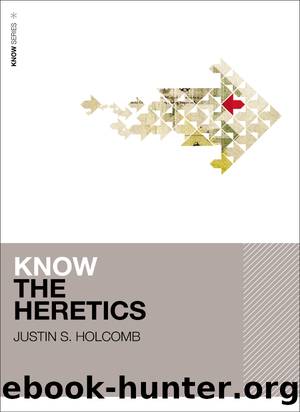Know the Heretics by Justin S. Holcomb

Author:Justin S. Holcomb [Holcomb, Justin S.]
Language: eng
Format: epub
Publisher: Zondervan
Published: 2018-12-02T00:00:00+00:00
Orthodox Response
The Arian division caught Emperor Constantineâs attention. Although Christianity was not the official religion, Constantine hoped to use Christianity as a glue to hold the already shaky empire together. As Christianity went, so went the empire. Thus, he called the Council of Nicaea in 325 to resolve the situation.9 After dramatic rounds of debates, the majority in the council stood with Alexander and condemned Arianism. They added to the Apostleâs Creed precise wording to clearly denounce Arianism with the following: âWe believe . . . in one Lord Jesus Christ, the Son of God, begotten from the Father [only-begotten; that is, of the essence of the Father, God of God], Light of Light, very God of very God, begotten not made, being of one substance [homoousious] with the Father . . .â10
They adopted the term homoousious, meaning, âof the same substance,â to describe the Sonâs relation to the Father. This horrified the Arians, but the orthodox bishops, such as Alexander and his young protege Athanasius, were overjoyed. However, even this council could not quell the rising popularity of Arianism. In fact the council served as a catalyst for it to grow even more rapidly! So much so that Constantine began to doubt the wording of the Nicene Creed and thought about rewriting it in favor of Arianism. One man stood in his way: Athanasius (ca. 296 â 373).
The torch passed on from Alexander to Athanasius to defend orthodoxy even when it was starting to become unpopular. Elected as the new Bishop of Alexandria in 328, Athanasius found it appalling that Arius insisted that the Son is a creature. He had no time for Ariusâs âsmooth sophistry.â11 A creature is a creature. What other types of creatures are there? Athanasius argued two negative consequences make Arianism dangerous and unacceptable.12
First, Athanasius argued that only God can save humanity. No creature can cancel the power of sin and death, and thereby offer eternal life to other creatures. Only the Creator can do this. So he argued that Arianism makes salvation impossible, because â no matter how high his status â the Son is still only a creature. Since everybody in the church recognizes that Jesus Christ saves, it stands to reason that Jesus is therefore God.
Second, looking at the common liturgy taking place in the fourth century, it was clear that the church prayed to and worshiped Jesus Christ. If the Son is only a creature, then the church is making a grave mistake in its public worship. Clearly, the first of the Ten Commandments forbids the people of God from worshiping anything else but God. If Arianism were true, Christians were committing idolatry.13 The church should not be worshiping Christ if he is merely a creature. So either Arians are right in their doctrine of the Son or the Church is right in its practice of worshiping the Son. Both cannot be right. Athanasius argued the church was right to worship the Son, because the Son is God.14
Athanasius called the heresy of Arius the âforerunner of the Antichrist.
Download
This site does not store any files on its server. We only index and link to content provided by other sites. Please contact the content providers to delete copyright contents if any and email us, we'll remove relevant links or contents immediately.
The Secret Power of Speaking God's Word by Joyce Meyer(3157)
Signature in the Cell: DNA and the Evidence for Intelligent Design by Stephen C. Meyer(3123)
Real Sex by Lauren F. Winner(3002)
The Holy Spirit by Billy Graham(2938)
The Gnostic Gospels by Pagels Elaine(2517)
Jesus by Paul Johnson(2349)
Devil, The by Almond Philip C(2323)
23:27 by H. L. Roberts(2245)
The Nativity by Geza Vermes(2222)
Chosen by God by R. C. Sproul(2158)
All Things New by John Eldredge(2150)
Angels of God: The Bible, the Church and the Heavenly Hosts by Mike Aquilina(1951)
The Return of the Gods by Erich von Daniken(1925)
Angels by Billy Graham(1917)
Knowing God by J.I. Packer(1848)
Jesus of Nazareth by Joseph Ratzinger(1802)
The Gnostic Gospel of St. Thomas by Tau Malachi(1781)
How To Be Born Again by Billy Graham(1775)
Evidence of the Afterlife by Jeffrey Long(1773)
